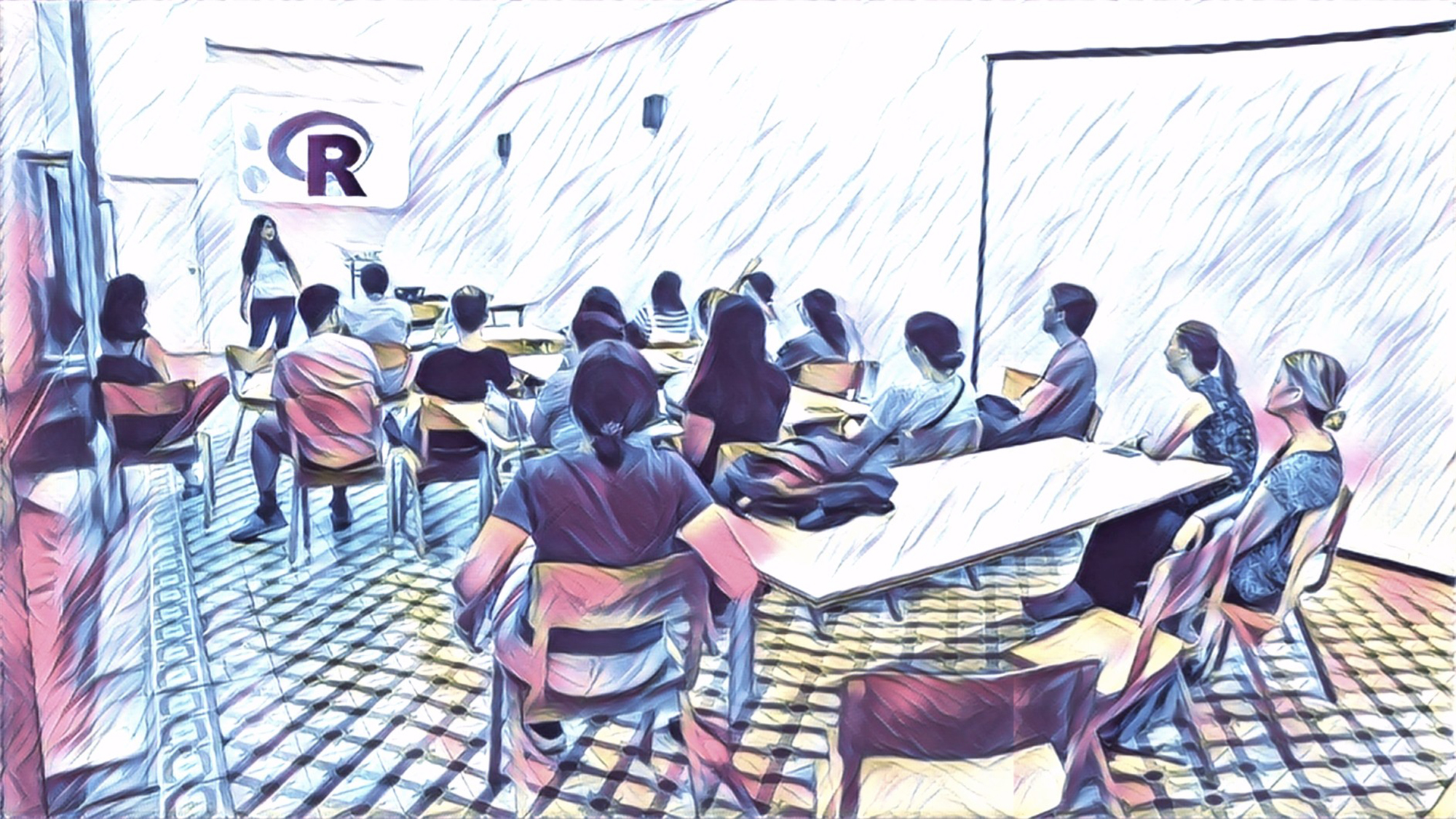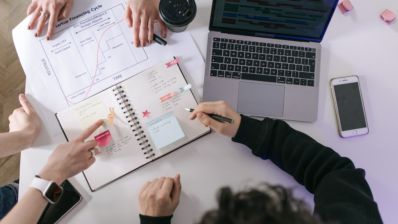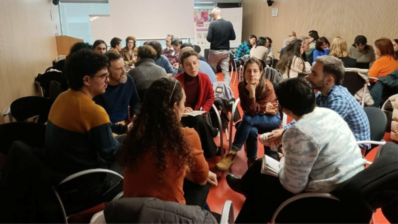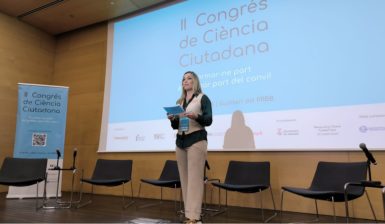Natalia Vilor-Tejedor has been for years at the Barcelona Biomedical Research Park (PRBB). She did her PhD at the Barcelona Institute for Global Health (ISGlobal), and is currently a postdoc between the Centre for Genomic Regulation (CRG) and the BarcelonaBeta Brain Research Center (BBRC) of the Fundació Pasqual Maragall (FPM).
Mireia Ramos-Rodríguez is doing her PhD on bioinformatics at the Germans Trias i Pujol Research Centre (IGTP) in Badalona.
They both are, along with Sarah Bonin and Ania Aloy, the organizers of Rladies Barcelona. In this interview, they tell us about this group and the next event they are organizing at the PRBB. The appointment is on October 15 at 7 pm in the Marie Curie room.
What is Rladies?
It is an worldwide organization, which attempts to promote gender diversity in the R community, a free software environment for statistical and graphic computing. And it does so mainly by supporting women – and other non-binary genres – interested in R to be able to develop their full programming potential. It was born informally in 2012, in the United States, and from 2016 it was constituted as a global movement.
How many Rladies meet up groups are there?
Nowadays there are more than 150 groups of Rladies around the world; we are in all continents! The coordinators of all the Rladies local groups are in contact digitally – through a slack group – where we can share experiences, materials, resources, etc.
Since when does the Barcelona node exist?
It was created in 2016 by Maelle Salmon, who at that time was a postdoctoral researcher at ISGlobal. Since then the group has had ups and downs, but we believe that we are now in a good trend. A city as important as Barcelona, had to have a core of Rladies, like San Francisco or London …! And through the social media (@RLadiesBCN)), we can encourage other European cities to create their own group.
What is your aim for Rladies Barcelona?
(Mireia) We want to create a community of women who can meet and share ideas; to create a safe space where they all have the opportunity to ask questions without the fear of being judged. It seems silly, but often in a computational environment where there is a large majority of men, there’s this pressure when you ask a question – even if it is very intelligent! -, you feel you are reinforcing the stereotype that women are “bad at computing”.
“We want to create a community of women who can share ideas in a safe space where they can ask questions without the fear of being judged”
Mireia Ramos-Rodríguez
(Natalia) For me, an important goal is to encourage women to present their work, their experience, their expertise. We women often have lower self-confidence, and underestimate the amount of knowledge we have about a topic. If we manage, in a workshop, that just one girl is encouraged to present at a following meeting, that she finds the enthusiasm and confidence to do so, I would be happy! So I encourage all the girls who work with R to come and present, even if it’s 5 minutes!
I work in research and I see it day in day out; being a woman, often you do not have the support of a senior male group leader or colleague. That is why we need a community that says “you are good, you have the knowledge, you just lack confidence“. At Rladies we offer a safe and friendly place to gain that confidence.
And is there a real need to have more female speakers?
Sure, there is a great lack of women, for example, in scientific conferences. It’s hard to find gender parity amongst the speakers. And there are always a thousand excuses; that there were more abstracts sent by men than women, etc. But I believe that what is happening is that there is a certain gender bias when choosing them… The conference abstracts should be sent anonymously!
What is the format of the Rladies meet ups?
Each node can organize them their own way … We usually do a workshop where we present a specific R package, and people bring their laptop and put it into practice. We have also added a series of 5-minute flash talks for those who want to share their experience without having to give a 1h talk… At the last meet up we also did some networking in the end, which helps to create a community.
And men can also come?
Yes! It is important that men become accustomed to seeing women as speakers, as someone they can learn from. We need to normalize that we are here, and that we can also have things to teach. But the goal of our meet ups is that the speakers are always women, and the public must be a majority of women, although we also welcome men. To achieve this, we have a new rule that if a man comes to a meet up, he should bring a woman with him. We had to introduce it after in some of the last meetings quite a few men came and they dominated the session…
Some may say it is discrimination against men…
(Natalia) In a way it is positive discrimination, it is true, but I think we are at a point in time when it is necessary to do this, when we have to say enough is enough. In generally in all social spheres, the feminist movement is becoming very active and we must take advantage of this moment. But this is not a movement ‘against’ men. Quite the opposite; we want them by our side. In fact any women’s movement needs the involvement of men, because otherwise things won’t change.
“We want men by our side; any women’s movement needs the involvement of men, because otherwise things won’t change.”
Natalia Vilor-Tejedor
(Mireia) In fact, we are lucky that the R community is very open. From the general R group, where there’s mostly men, many have offered to help us advertise our events, and they have invited us to some of the events they are organizing. In other areas, things are very different. I’ve talked to video game developers, and there’s a very toxic community against women; the female groups that have formed have even received death threats!
What is the profile of the people that comes to your meet ups?
There’s a bit of everything. The average is perhaps 25-35 years old but there is a lot of variation. The four organizers, we are all bioinformaticians, but since R is useful in so many subjects, there are people who work in a wide range of fields, from public health, linguistics, data science, etc.
When will the next Rladies Barcelona meet up be?
(Natalia) We try to have monthly meet ups, but it depends on how busy we are, on whether we find people who want to present… We will also try to rotate the spaces where we meet. The next event will be at the PRBB, on October 15 at 7 pm in the Marie Curie room. It’s called “Improve your plots with ggplot2“, and Mireia will be presenting. The course is about visualizing data, how to make graphics. It is one of the most requested ones, we have already done it before.
The next event, about how to visualise data and create graphics, will be at the PRBB, on October 15 at 7 pm in the Marie Curie room.
(Mireia) Yes, in research there are many people who use R, even if they are not experts, just to make charts. It allows you to summarize a lot of information in a very visual and interactive way, and it gives you many possibilities, it is very versatile. It can be used for a lot of things … so come and sign up now for our next meet up!
Check out this video interview (in Catalan) with the two bioinformaticians:







